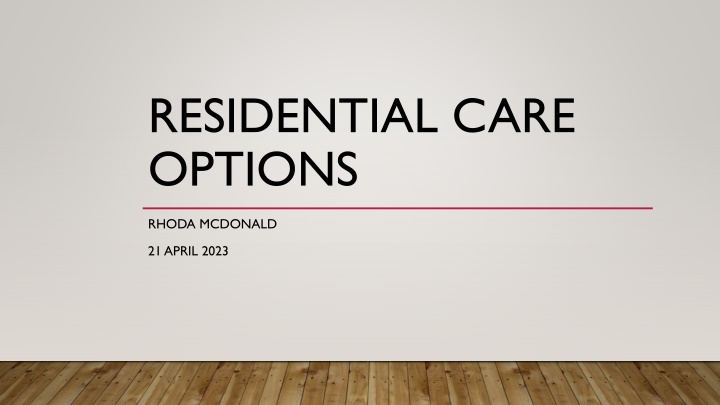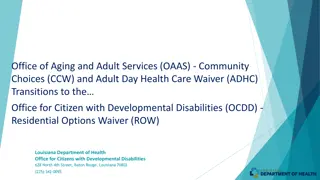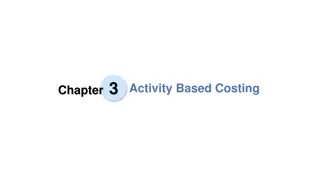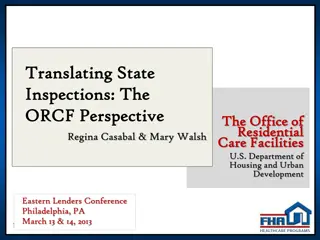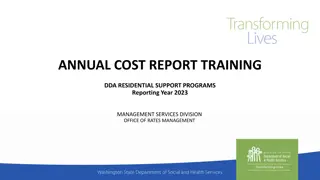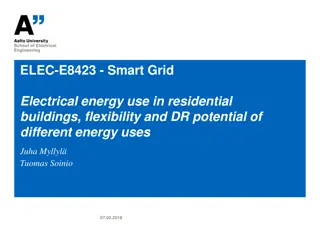Residential Care Options and Cost Breakdown
Various residential care options like Assisted Living, Retirement Villages, and Care Homes. Understand the pros and cons associated with each choice along with the costs involved. Gain insights into Abbeyfield houses and learn about the financial aspects of residing in residential villages. Discover the important factors to consider when planning for senior care and accommodation.
Download Presentation

Please find below an Image/Link to download the presentation.
The content on the website is provided AS IS for your information and personal use only. It may not be sold, licensed, or shared on other websites without obtaining consent from the author.If you encounter any issues during the download, it is possible that the publisher has removed the file from their server.
You are allowed to download the files provided on this website for personal or commercial use, subject to the condition that they are used lawfully. All files are the property of their respective owners.
The content on the website is provided AS IS for your information and personal use only. It may not be sold, licensed, or shared on other websites without obtaining consent from the author.
E N D
Presentation Transcript
RESIDENTIAL CARE OPTIONS RHODA MCDONALD 21 APRIL 2023
A COUPLE OF FACTS. 1. We are all getting older 2.We will all have one death event
PRESENTATION AGENDA Assisted Living (Abbeyfield) Retirement Villages Pro s and Con s Care Homes Rest Home Hospital Level Dementia Care Suites Processes for access Costs Planning for Change
ABBEYFIELD An Abbeyfield house is particularly suitable if you: are over 65 are normally mobile enjoy reasonably good health are clear mentally can care for yourself independently can maintain your own medication routines can live flexibly with others, sharing meals and common living areas.
RETIREMENT VILLAGES PROS Providing peace of mind, safety and security. Having a host of activities and interests to participate in. The opportunity to make new friendships. Being free to do the things you enjoy and not having to worry about home maintenance or other chores. The opportunity to access care and support on-site when needed
RETIREMENT VILLAGES CONS The social aspect: communal living associated with a retirement village won't suit everybody. The cost: All villages have associated costs, including weekly fees and exit costs. You are also unlikely to receive a capital gain when your unit is on- sold.
RESIDENTIAL VILLAGES THE COST $$$ 1. Deposit and Capital Investment To secure Occupation Right Agreement (ORA) you will then become a resident with a contractual right to occupy (not own) a particular property in the village 2. Management Fee As per the ORA, the village operator retains around 20% to 30% of the initial capital as a deferred management fee, which covers the maintenance of communal areas and resources, property renovation once the license ends, and other financial costs. 3. Periodic Fees Residents will also pay periodic fees to cover daily operating expenses like staff wages, insurance, grounds maintenance, and village services. The fee amount may vary, so you must ask the village manager for details.
RESIDENTIAL VILLAGES Golden Bay has no village options available Motueka Woodlands (an Oceania facility) has these options available Richmond and Nelson has multiple options available.
RESIDENTIAL CARE HOMES Rest homes (care homes) provide 24-hour care to people who are no longer able to live independently. Rest Home Level Hospital Level Dementia Care
HOW IS REST HOME CARE PROVIDED? Rest home care is provided in a dedicated facility by trained caregivers and registered nurses. In New Zealand, both private companies and not-for-profit organisations provide rest home care. Golden Bay Community Health provides Rest Home and Hospital level care (nearest Dementia Care facility is Mokueka, Jack Inglis Care Home)
WHO IS ELIGIBLE FOR REST HOME CARE? A needs assessment will determine whether someone is eligible for rest home care. Your GP, District Nurse or Practice Nurse can initiate this
WHAT IS THE COST OF REST HOME CARE IN NEW ZEALAND? There are regulations around how much a rest home can charge for care. A maximum contribution is set by the Ministry of Health and is approximately $174. per day. Fees may exceed the maximum contribution if someone opts for additional or premium services.
WHAT IS THE RESIDENTIAL CARE SUBSIDY? The residential care subsidy is government funding towards the cost of rest home care. It s means tested and depends on a resident s income and assets.
TYPES OF ROOMS IN CARE HOMES Standard Premium Care Suites (Most care suites are sold on an Occupation Right Agreement).
PLANNING FOR CHANGE Whatever stage in life you are at, sorting and discarding what you really don t need on an ongoing basis is a good thing Marie Kondo if something doesn t give you joy, thank it for its time in your life and then get rid of it
PLANNING FOR CHANGE Other decisions have far greater consequences and may cause heartache and anxiety As we age me may lose family, friends, neighbours, become frail, be unable to keep up the garden, drive etc Such changes mean our housing may no longer be fit for purpose now and in the years ahead
